Surgical care has advanced significantly, and women no longer have to undergo large incisions and lengthy recoveries for many gynecologic procedures.
At Craig Ranch OB/GYN in McKinney, Texas, our board-certified OB/GYNs specialize in laparoscopic surgery. This minimally invasive technique can be used to treat conditions like endometriosis, fibroids, and ovarian cysts with greater precision and less downtime.
With our team’s advanced training and decades of experience in minimally invasive surgery, we can focus purely on your comfort and long-term health.
What Is Laparoscopic Surgery?
Laparoscopic surgery is a type of minimally-invasive surgical technique that works by creating multiple small incisions to operate as opposed to the kind of larger incisions you would expect from open surgeries. This is made possible because the procedure is performed delicately with the use of a surgical camera that allows your surgeon to see and operate on all of the vital areas. The surgical camera is affixed to the end of a thin tube that slips easily through one of the incisions.
The video that the camera then captures is transmitted back up the tube to a screen where your surgeon will be able to accurately navigate small instruments through a few additional incisions as needed to repair or remove tissue. Once the problem is resolved, the incisions will be stitched back together, and your recovery process can begin.
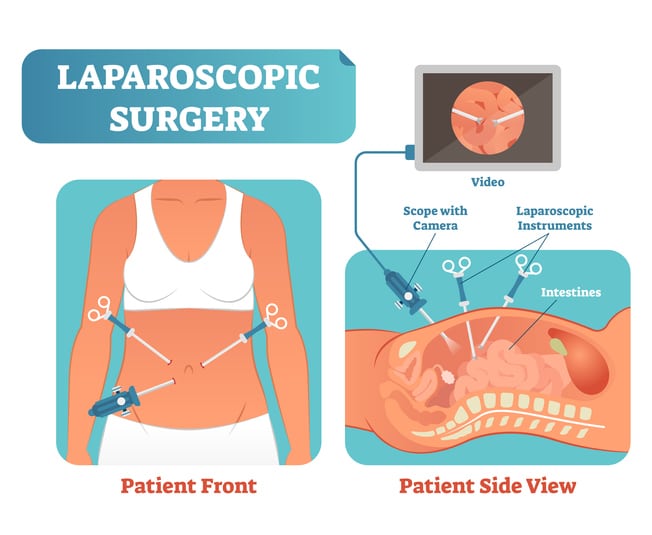
What Conditions Are Treated With Laparoscopic Surgery?
Laparoscopy is a common procedure used in the diagnosis and treatment of chronic pelvic pain, pelvic masses, and infertility. Some of the conditions for which this technique may be recommended include:
Fibroids
Fibroids are typically benign growths that develop on the lining of the uterus. Fibroids may exist either inside the uterus or on the outside wall, where they cause heavy menstruation and, most likely, pain or discomfort.
Current estimations show that the majority of women – about 70% to 80% – will develop fibroids at some point during their lifetimes. However, the good news is that most will also not develop any of the negative symptoms and, as such, will not need to undergo laparoscopic surgery.
Endometriosis
This condition is a disease where your body's endometrium – the inner lining of the uterus – begins to also grow outside of the uterus. This can cause intense abdominal and pelvic pain while also making it more difficult to become pregnant.
Unfortunately, it can also be a recurrent problem, beginning around the time of a woman’s first period and ending as menopause sets in.
Ectopic Pregnancy
An ectopic pregnancy, though very rare, occurs when a fertilized egg implants outside of the uterus. About 95% of the time, this occurs in a fallopian tube. When this happens, life-threatening complications can occur. As the fertilized egg begins to grow, it will eventually cause the fallopian tube to rupture or burst, which leads to significant internal bleeding that can be fatal if left untreated.
Thankfully, laparoscopic surgery in McKinney, TX, can be used to remove the egg before this occurs, as there will be clear warning signs of pelvic pain and vaginal bleeding before a burst occurs.
Hysterectomy
A hysterectomy, the surgical removal of the uterus, may be necessary for conditions such as fibroids, endometriosis, chronic pelvic pain, or certain cancers.
Depending on the medical need, the procedure may involve removing only the uterus or also the cervix, fallopian tubes, or ovaries.
Pelvic Floor Disorders
Pelvic floor disorders occur when the muscles and connective tissues that support the pelvic organs weaken or become damaged. This can lead to conditions such as pelvic organ prolapse and urinary incontinence, which may cause discomfort, pressure, or difficulty controlling bladder function.
In cases where conservative treatments don’t work, laparoscopic surgery can be used to repair and strengthen the pelvic floor.
Ovarian Cysts
Ovarian cysts are fluid-filled sacs that develop on the ovaries, often without causing symptoms. While many cysts resolve on their own, some may persist, grow larger, or cause pain and complications.
If a cyst becomes symptomatic, laparoscopic surgery can be performed to remove it while preserving healthy ovarian tissue. This minimally invasive approach helps prevent complications such as ovarian torsion or rupture.
Gynecological Cancers
Laparoscopic surgery is an option for treating certain gynecological cancers, including early-stage ovarian, uterine, and cervical cancers.
In some cases, laparoscopic surgery may be used for staging cancer, assessing the extent of disease spread, or performing a hysterectomy when necessary. Treatment plans vary based on the specific diagnosis and progression of the condition.
What Are The Benefits Of Laparoscopic Surgery?
There are several benefits obtained with laparoscopic surgery. These include:
- Minimally invasive technique incurs small incisions.
- Laparoscopic procedures are often performed on an outpatient basis.
- Recovery from laparoscopic procedures is generally shorter than open surgery techniques.
- Scarring from laparoscopic surgery is minimal.
- Risk of infection is reduced when smaller incisions are made.
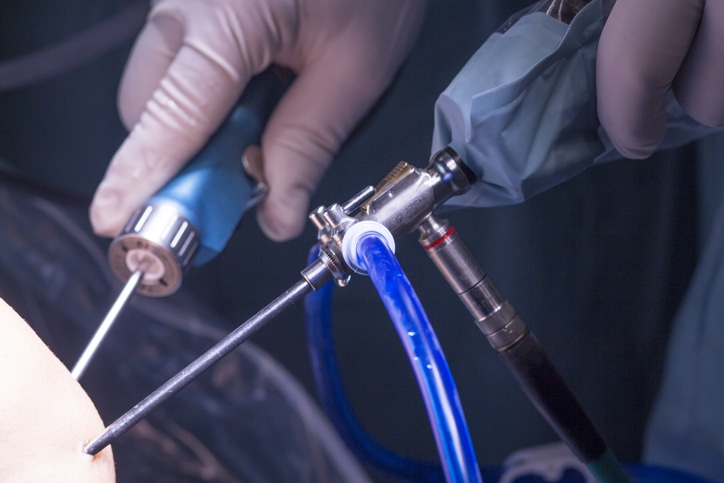
What Is The Best Way To Prepare For Laparoscopic Surgery?
There is very little preparation needed for pelvic laparoscopic surgery. We provide detailed instructions regarding when you need to stop eating and drinking, what medications you may need to stop or start taking, and other guidelines. If you have questions as your surgery date arrives, please contact our office. We’re happy to assist you.
How Is Laparoscopic Surgery Performed?
Laparoscopic surgery may be conducted in a hospital or outpatient surgery center. The procedure is performed using general anesthesia. Once the anesthesia has been administered, a small incision is made in the abdomen. The abdominal cavity is then filled with gas, and this enables the surgeon to accurately observe pelvic and reproductive organs with help from the aforementioned surgical camera. Your surgeon will then begin to operate as described above in the section defining laparoscopic surgery in McKinney, TX.
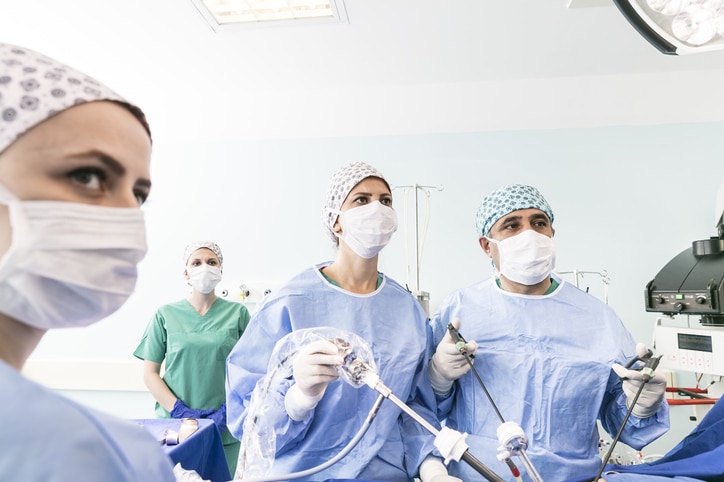
How Long Does A Laparoscopic Procedure Take?
Laparoscopic surgery typically lasts about an hour but may take longer, depending on the extent of treatment needed. However, once the surgery is completed, you will have to spend additional time in the hospital or outpatient surgery center as the anesthetics and sedatives wear off, and the doctors can ensure that you are well enough to head home.
What To Expect After Laparoscopic Surgery
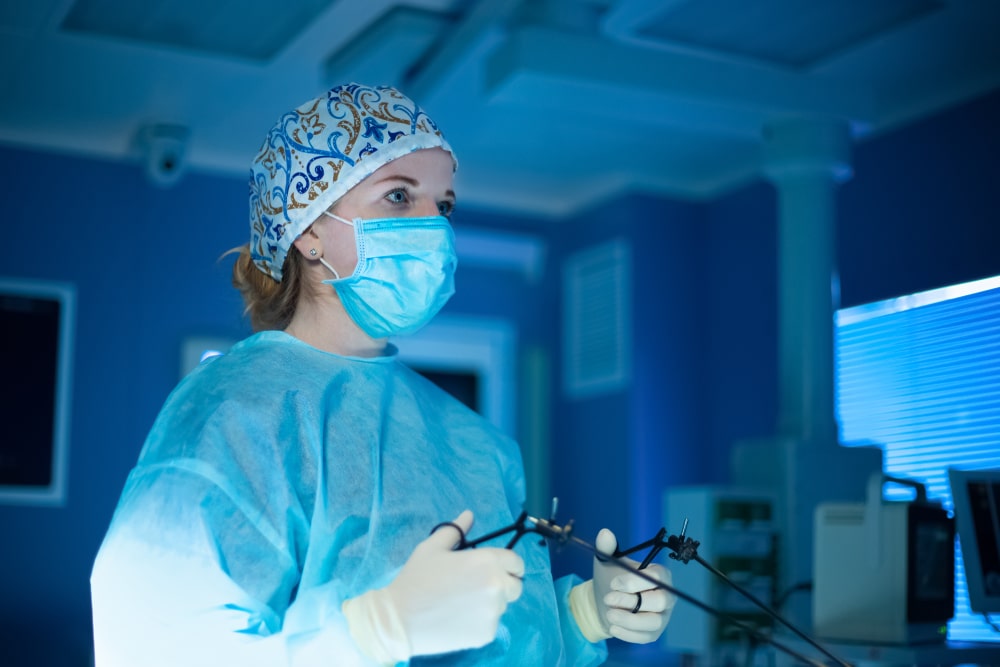
After the procedure is completed, the initial recovery takes place in the surgical center. Patients are observed and monitored until the anesthesia wears off enough for them to stand on their own. They may then be driven home by a loved one.
Recovery After Laparoscopic Surgery
Women treated with laparoscopic surgery typically return home with stitches or Steri-strips. Depending on what the surgeon inserts, stitches may need to be removed a few days after surgery. Sometimes, sutures are absorbable. Patients are informed of the type of closure used during their procedure and are scheduled as needed for their appropriate follow-up.
Bandages used to cover incisions may be removed 1 to 2 days after surgery. If strips are used, they may fall off over the course of several days. It is important to keep incisions clean but not necessary to rub them with soap or apply any ointments or creams to them.
It is normal for pain or numbness to occur around incisions. Patients may also experience discomfort around incisions as well as internally, where tissue has been manipulated. This may feel like bloating or cramping. Women who undergo laparoscopic surgery may also notice shoulder pain for up to one week after their procedure. These types of discomfort related to gas buildup in the intestines as well as the effects of filling the abdominal cavity with gas during surgery.
During recovery from laparoscopic surgery, medication can be taken as needed and as directed to manage comfort. If pain is minimal or does not develop, it is not necessary to take medication as a form of prevention.
What Are The Risks Of Laparoscopic Surgery?
There are minor risks associated with laparoscopic surgery, including:
- Complications related to anesthesia
- Internal bleeding
- Hernia
- Infection
- Damage to an organ or blood vessel
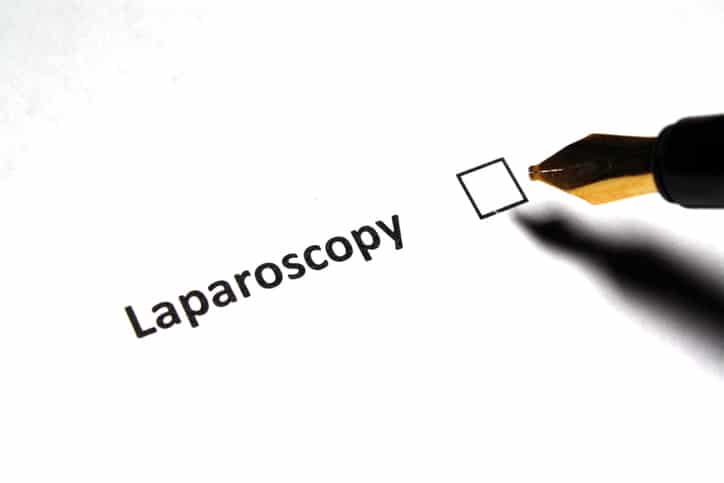
How Do I Know if I Am a Good Candidate for Laparoscopic Surgery?
Determining if you are a good candidate for laparoscopic surgery involves a thorough evaluation. Factors that may influence suitability may include:
- Overall health
- The specific medical condition you aim to treat (endometriosis, ovarian cysts, fibroids, pelvic pain, etc.)
- Previous abdominal surgeries
- Existing medical conditions
During your consultation, a surgeon will review your medical history, perform necessary examinations, and discuss the benefits and risks. They will ensure this procedure is appropriate for you before they proceed.
Can Laparoscopic Surgery Affect Fertility?
Laparoscopic surgery can have varying impacts on fertility. The exact effect depends on the condition being treated and the extent of the procedure.
For many women, laparoscopic surgeries can enhance fertility. This is particularly true when addressing issues such as endometriosis, ovarian cysts, or blocked fallopian tubes.
These conditions, if left untreated, can impede fertility. Surgical intervention may improve your chances of conceiving.
It’s crucial to discuss fertility goals with your surgeon before the procedure. The specialists at Craig Ranch OB/GYN will provide personalized care. They will also discuss any potential impacts on your reproductive health.
Will I Need to Stay in the Hospital Overnight?
Whether you need to stay overnight in the hospital after laparoscopic surgery depends on the specific procedure and individual recovery progress.
Many laparoscopic surgeries are performed on an outpatient basis. This means you can return home the same day.
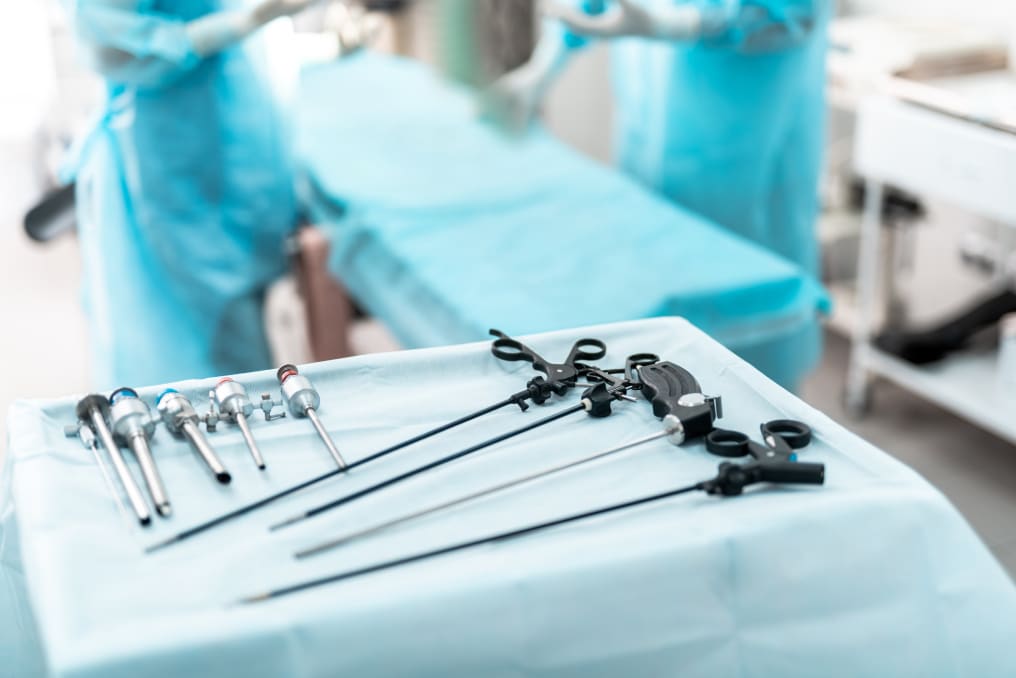
More complex procedures or certain patient conditions might require an overnight stay for observation and pain management.
Your surgeon will provide you with a detailed postoperative plan. They will determine the best course of action based on your unique needs.
What Are the Signs of Infection to Look Out for After Surgery?
Postoperative infections are rare. However, they can occur after laparoscopic surgery. That’s why monitoring your recovery and being aware of signs of infection is essential.
Symptoms to watch for include:
- Increased redness
- Swelling
- Warmth around the incision sites
- Fever
- Chills
- Unusual or foul-smelling discharge from the incision
- Persistent pain that worsens instead of improving
If you experience any of these symptoms, contact your surgeon immediately. Prompt attention to these signs ensures a smooth recovery and helps prevent complications.
Can Laparoscopic Surgery Be Used to Diagnose Conditions as Well as Treat Them?
Laparoscopic surgery is valuable for both diagnosing and treating various medical conditions.
Your surgeon will insert a small camera through a tiny incision during a diagnostic laparoscopy. This allows them to see internal organs and tissues in real time.
This minimally invasive procedure is particularly useful for diagnosing issues like:
- Chronic pelvic pain
- Unexplained infertility
- Endometriosis
Treatment can often be performed simultaneously if a problem is detected during the diagnostic phase. This reduces the need for further surgeries and ensures a quicker path to healing.
How Does Laparoscopic Surgery Impact Long-Term Health Outcomes Compared to Open Surgery?
Laparoscopic surgery generally offers better long-term health outcomes compared to traditional open surgery. The minimally invasive nature of the procedure means smaller incisions. That leads to reduced pain, lower risk of infection, and quicker recovery times.
Patients often experience shorter hospital stays and can return to normal activities sooner. Additionally, the precision of laparoscopic surgery minimizes trauma to surrounding tissues. This can lead to less scarring and a lower likelihood of complications.
How Soon Can I Return to Normal Activities After Laparoscopic Surgery?
Recovery time varies based on the procedure and your healing response. Many women can resume light activities within a few days and return to work within a week if their job is not physically demanding.
Strenuous activities, including heavy lifting and intense exercise, should generally be avoided for at least two to four weeks. We will provide guidelines based on your procedure and recovery progress.
Are There Any Dietary Restrictions Before and After Laparoscopic Surgery?
Before surgery, we may instruct you to avoid eating or drinking for a set period, typically starting the night before the procedure. After surgery, a gradual return to a normal diet is recommended. Some patients experience temporary bloating, nausea, or constipation due to the effects of anesthesia and gas used during the procedure. Drink plenty of water and eat fiber-rich foods to help ease digestion during recovery.
How to Manage Pain and Discomfort After Laparoscopic Surgery
Mild to moderate pain is common after laparoscopic surgery. Over-the-counter pain relievers or prescribed medications can help manage this discomfort. You can also apply a heating pad to your shoulders and walk around periodically to help relieve shoulder pain from the gas used during the surgery. Most of your discomfort should improve within a few days as your body heals.
What Are the Most Common Reasons a Laparoscopic Surgery Might Be Converted to Open Surgery?
In some cases, a laparoscopic procedure may need to be converted to open surgery. This decision is made if the surgeon encounters excessive scar tissue, unexpected bleeding, or difficulty accessing the surgical site.
Certain conditions, such as large fibroids or severe endometriosis, may also require an open approach for complete treatment. While this is uncommon, your safety is always our top priority, and we will discuss this possibility with you prior to your surgery.
Does Insurance Cover Laparoscopic Surgery?
Most insurance plans cover laparoscopic surgery if it is deemed medically necessary. The extent of coverage depends on your specific policy and the reason for the procedure. We suggest checking with your insurance provider in advance to understand the potential costs, deductibles, and any required pre-authorizations.
If you need assistance, our friendly office staff can help with verifying benefits and navigating the insurance and payment process.
Why Choose Craig Ranch OB/GYN?
Craig Ranch OB/GYN is a top-rated obstetrics and gynecology practice. We are known for offering advanced care, including laparoscopic surgery.
Our practice stands out, in part, due to its team of board-certified physicians. They have received training from some of the most prestigious programs in the country and have over 50 years of combined experience.
The team is also committed to staying up-to-date with the latest advances in women’s health. We ensure patients receive the most effective and cutting-edge treatments available.
What Our Patients Have To Say
This office is awesome! All the Doctors are so caring and really take their time with their patients. They addressed all my concerns and I did not feel rushed at all. The office is beautiful and so clean. The office staff was very helpful and knowledgeable. I could tell they all enjoy their jobs. I highly recommend Craig Ranch OB/GYN.
I LOVE this practice! I was referred to Craig Ranch OBGyn after having a terrible experience with a botched procedure at a different practice. I have regularly seen both Dr. Robert and Dr. Baidwan and they are both just amazing! They are very friendly, very knowledgeable and very good at their jobs. The front office staff is so friendly too, and I’ve loved the nurses as well. I always look forward to my visits, I know I’m going to be well taken care of.
Schedule Your Consultation Today
If you are interested in learning more about our Laparoscopic procedures to see if you are an ideal candidate, please call us at 214.544.6600 or fill out our contact form to schedule a consultation. Craig Ranch OB/GYN is proud to serve McKinney, TX, and the surrounding areas.
